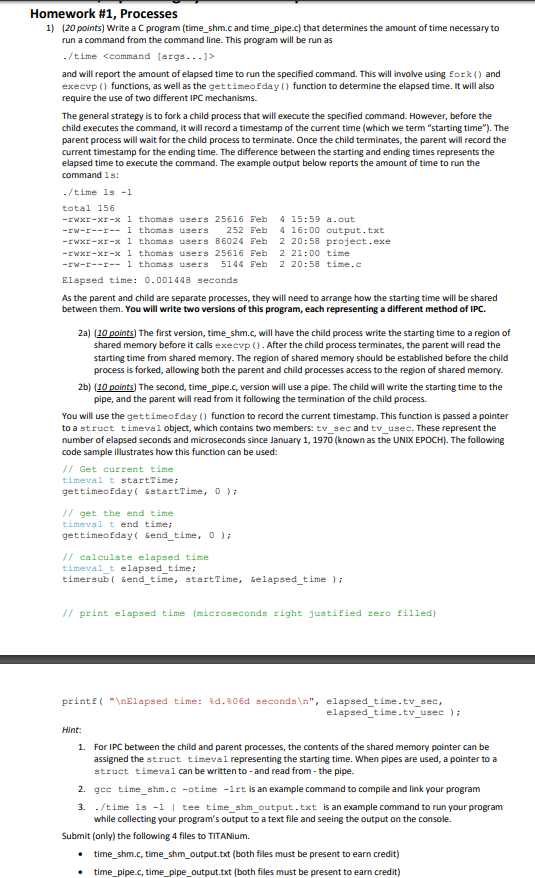Please provide a source code in C++ Language

Homework #1, Processes 1) 20 points) Write a C program (time shm.c and time pipe.c) that determines the amount of time necessary to run a command from the command line. This program will be run as /time
and will report the amount of elapsed time to run the specified command. This will involve using fork ) and exeevp ) functions, as well as the gettimeofday ) function to determine the elapsed time. It will also require the use of two different IPC mechanisms. The general strategy is to fork a child process that will execute the specified command. However, before the child executes the command, it will record a timestamp of the current time (which we term "starting time"). The parent process will wait for the child process to terminate. Once the child terminates, the parent will record the current timestamp for the ending time. The difference between the starting and ending times represents the elapsed time to execute the command. The example output below reports the amount of time to run the command 1s: /time 1s -1 total 156 -rwxr-xr-x 1 thomas users 25616 Feb 4 15:59 a.out -rw-r-r thomas users 252 Feb 16:00 output.txt -rwxr-xr-x 1 thomas users 86024 Feb 2 20:58 project.exe -rwxr-xr- 1 thomes users 25616 Feb 2 21:00 time -rw-r--r1 thomaes users 5144 Feb 2 20:58 time.c Elapsed time: 0.001448 seconds As the parent and child are separate processes, they will need to arrange how the starting time will be shared between them. You will write two versions of this program, each representing a different method of IPC. 2a) (10points) The first version, time shm.c, will have the child process write the starting time to a region of shared memory before it calls execvp ). After the child process terminates, the parent will read the starting time from shared memory. The region of shared memory should be established before the child process is forked, allowing both the parent and child processes access to the region of shared memory. 2b) (10 points) The second, time pipe.c, version will use a pipe. The child will write the starting time to the pipe, and the parent will read from it following the termination of the child process You will use the gettimeofday () function to record the current timestamp. This function is passed a pointer to a struct timeval object, which contains two members: tvsec and tv usec. These represent the number of elapsed seconds and microseconds since January 1, 1970 (known as the UNIX EPOCH). The following code sample illustrates how this function can be used // Get current time timeval t startTine: gettimeofday sstartTime, 0 // get the end time timeval t end time; gettimeofdaySend time, o i /I calculate elapsed time timeval_t elapsed timei timersub &end time, startTime, &elapsed timei // print elapsed time (microseconds right justified zero filled) print InElapsed time: Rd.806d secondsIn", elapsed time.tv sec elapsed time.tv usec Hint 1. For IPC between the child and parent processes, the contents of the shared memory pointer can be assigned the struct struet tineval can be written to -and read from- the pipe. timeval representing the starting time. When pipes are used, a pointer to a 2. gce time_shm.c -otime -1rt is an example command to compile and link your program 3. . /time 1s -1 l tee time-shm-output. txt s an example command to run your program while collecting your program's output to a text file and seeing the output on the console. Submit (only) the following 4 files to TITANium. time_shm.c, time shm_output.txt (both files must be present to earn credit) time_pipe.c, time_pipe output.txt (both files must be present to earn credit) Homework #1, Processes 1) 20 points) Write a C program (time shm.c and time pipe.c) that determines the amount of time necessary to run a command from the command line. This program will be run as /time and will report the amount of elapsed time to run the specified command. This will involve using fork ) and exeevp ) functions, as well as the gettimeofday ) function to determine the elapsed time. It will also require the use of two different IPC mechanisms. The general strategy is to fork a child process that will execute the specified command. However, before the child executes the command, it will record a timestamp of the current time (which we term "starting time"). The parent process will wait for the child process to terminate. Once the child terminates, the parent will record the current timestamp for the ending time. The difference between the starting and ending times represents the elapsed time to execute the command. The example output below reports the amount of time to run the command 1s: /time 1s -1 total 156 -rwxr-xr-x 1 thomas users 25616 Feb 4 15:59 a.out -rw-r-r thomas users 252 Feb 16:00 output.txt -rwxr-xr-x 1 thomas users 86024 Feb 2 20:58 project.exe -rwxr-xr- 1 thomes users 25616 Feb 2 21:00 time -rw-r--r1 thomaes users 5144 Feb 2 20:58 time.c Elapsed time: 0.001448 seconds As the parent and child are separate processes, they will need to arrange how the starting time will be shared between them. You will write two versions of this program, each representing a different method of IPC. 2a) (10points) The first version, time shm.c, will have the child process write the starting time to a region of shared memory before it calls execvp ). After the child process terminates, the parent will read the starting time from shared memory. The region of shared memory should be established before the child process is forked, allowing both the parent and child processes access to the region of shared memory. 2b) (10 points) The second, time pipe.c, version will use a pipe. The child will write the starting time to the pipe, and the parent will read from it following the termination of the child process You will use the gettimeofday () function to record the current timestamp. This function is passed a pointer to a struct timeval object, which contains two members: tvsec and tv usec. These represent the number of elapsed seconds and microseconds since January 1, 1970 (known as the UNIX EPOCH). The following code sample illustrates how this function can be used // Get current time timeval t startTine: gettimeofday sstartTime, 0 // get the end time timeval t end time; gettimeofdaySend time, o i /I calculate elapsed time timeval_t elapsed timei timersub &end time, startTime, &elapsed timei // print elapsed time (microseconds right justified zero filled) print InElapsed time: Rd.806d secondsIn", elapsed time.tv sec elapsed time.tv usec Hint 1. For IPC between the child and parent processes, the contents of the shared memory pointer can be assigned the struct struet tineval can be written to -and read from- the pipe. timeval representing the starting time. When pipes are used, a pointer to a 2. gce time_shm.c -otime -1rt is an example command to compile and link your program 3. . /time 1s -1 l tee time-shm-output. txt s an example command to run your program while collecting your program's output to a text file and seeing the output on the console. Submit (only) the following 4 files to TITANium. time_shm.c, time shm_output.txt (both files must be present to earn credit) time_pipe.c, time_pipe output.txt (both files must be present to earn credit)







